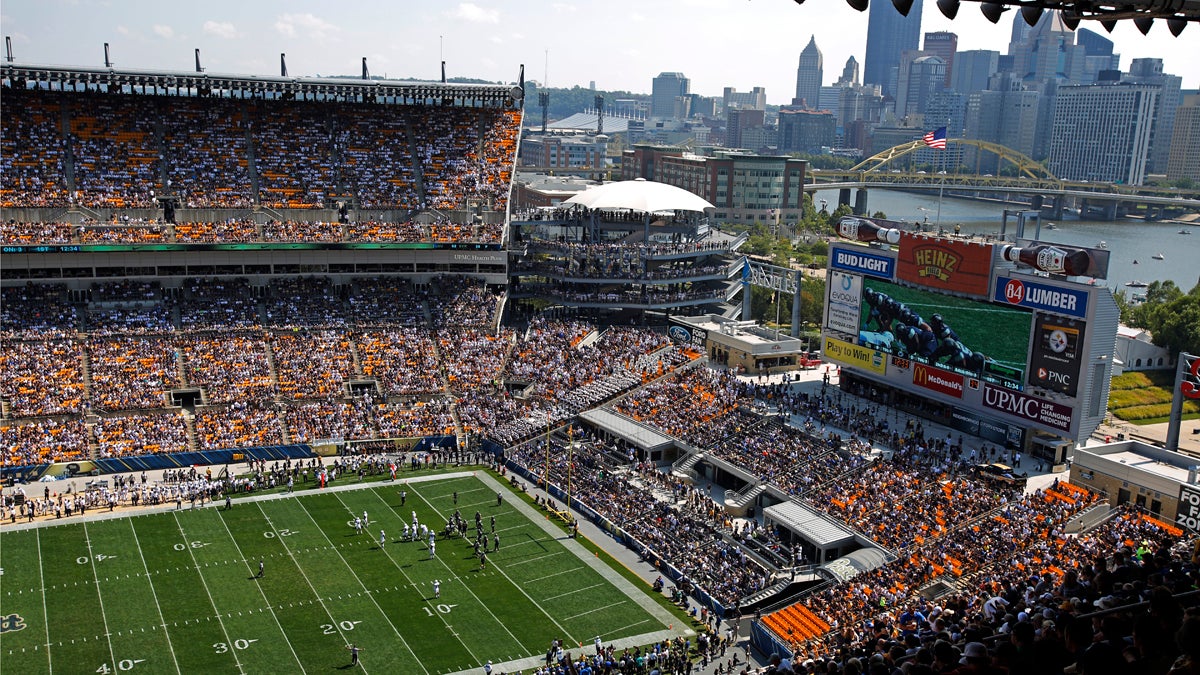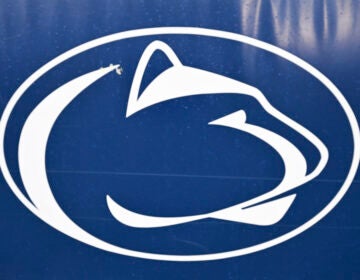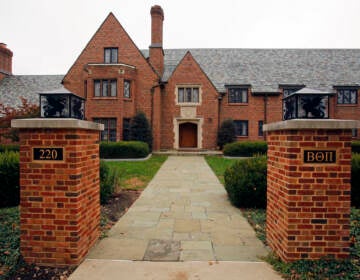Two schools of thought on Pa. venture into sports wagering
Penn State University wants a moratorium on college sports betting — while the University of Pittsburgh wants a piece of the action.

University of Pittsburgh play Penn State at Heinz Field during the first half of an NCAA college football game in Pittsburgh. (AP Photo/Gene J. Puskar)
When Pennsylvania approved sports gambling, the issue of how college sports would be treated wasn’t spelled out.
Two of the state’s largest universities have vastly different approaches to the issue.
Penn State University wants a moratorium on college sports betting, while the University of Pittsburgh wants a piece of the action.
After the U.S. Supreme Court struck down a decades old federal law that banned sports betting in May, Pennsylvania continued its gambling expansion with sports wagering.
The state Gaming Control Board passed temporary regulations in May and accepted public comments on the venture until mid-June.
According to their letters, Penn State wants a two-year, temporary ban on college sports betting, while Pitt wants “integrity fees” to pay for additional expenses it incurs.
Increased fees are out of the question because state lawmakers control that, said Doug Harbach, spokesman for the state’s Gaming Control Board.
“Anything that has to do with additional revenue generation beyond taxes that are already outlined in the act would be problematic for us. We simply can’t do that,” he said.
The 36 percent tax rate was set in a 2017 gambling law. Thirty-four percent goes to the state’s general fund and 2 percent to programs in the counties and municipalities.
“But other issues that have been brought up in this public input from the colleges are very important to us, and we will certainly utilize it as we move forward with the construction of regulations,” Harbach said.
Penn State says Act 42, the gambling law that permitted sports betting in the state, doesn’t “incorporate any provisions to ensure the integrity of the sport events — namely collegiate athletic events.”
The letter, signed by Penn State President Eric Barron, notes that amateur athletes are not compensated and may be more susceptible to influence.
“The absence of financial compensation for amateur athletes creates an opportunity for inappropriate influence, which is not uniformly addressed in Act 42 and in some parts not addressed at all,” he wrote.
The university proposes using the two-year temporary period to prohibit betting on college sports so the school can put policies, procedures, and educational programs in place, as well as train and hire additional staff.
That time frame would give the university an opportunity to lobby the General Assembly to make legislative changes, such as incorporating anti-cheating provisions and perhaps an integrity fee to cover anticipated compliance costs.
The University of Pittsburgh’s letter also addresses concerns that sports wagering will have a negative impact on the integrity of college athletics — and raise other issues that colleges haven’t faced yet.
“All of this will add considerable financial cost to Pitt’s operations,” wrote Heather Lyke, Pitt’s director of athletics. “In light of that, appropriate impact fees should be paid to affected colleges and universities to cover that cost.”
Lyke suggested establishing a “gamble responsibly” program to focus on student education and coordination efforts throughout the commonwealth.
The Pitt letter also suggests universities appoint liaisons to the Gaming Control Board.
The NCAA had opposed “all forms of legal and illegal sports wagering,” but after the Supreme Court decision, the organization modified its stance. It suspended a policy that prohibited states with sports wagering from hosting championships.
And it supports federal oversight of sports wagering.
“While we recognize the critical role of state governments, strong federal standards are necessary to safeguard the integrity of college sports and the athletes who play these games at all levels,” said Mark Emmert, NCAA president, in a statement.
The Gaming Control Board will implement the second set of temporary regulations at its public board meeting Wednesday. Those regulations will address what’s required of service providers such as casinos, manufacturers, and suppliers.
The third set of regulations, expected to be taken up next month, will address conduct, including whether there should be a moratorium on amateur sporting events.
Harbach said there is no timeline for adopting the regulations or rolling out sports betting.
“As we craft these regulations, one of the most important aspects is to make sure there’s integrity in the wagering because our biggest issue in oversight is to protect the public,” he said. “And we’re not going to unleash sports wagering in Pennsylvania until we’re sure that that has been accomplished.”
So far, the board has not received any petitions from casinos yet. Harbach said he isn’t surprised, because the regulations aren’t set and casinos still need time to form partners.
Casinos must pay $10 million to get a sports betting certificate.
New Jersey, which passed sports betting this month after winning its Supreme Court case, has banned betting on amateur sports events throughout the state.
WHYY is your source for fact-based, in-depth journalism and information. As a nonprofit organization, we rely on financial support from readers like you. Please give today.




